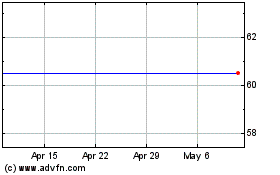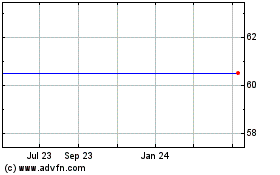European Companies Use Old-School Budget Tactic to Cut Costs
April 07 2017 - 1:48PM
Dow Jones News
By Nina Trentmann
Unilever PLC plans to save up to EUR6 billion ($6.4 billion)
using a decades-old financial tactic that is coming into vogue
again.
The Anglo-Dutch consumer giant plans to extend its use of
zero-based budgeting to reduce spending in its marketing and
logistics departments, according to finance chief Graeme
Pitkethly.
In zero-based budgeting, finance managers plan each year's
budget as if starting their department from scratch -- contrary to
the prevailing method of adjusting the previous year's spending.
The technique forces them to justify the costs and evaluate
benefits every 12 months.
"Zero-based budgeting brings much greater visibility to exactly
what we are spending and where," Mr. Pitkethly said during a call
with analysts Thursday. "It's also a great process for challenging
the status quo."
More European firms are following the example set by their U.S.
peers and use a budgeting technique initially invented in the 1970s
to reduce spending. More efficient technology, greater data and
artificial-intelligence tools are helping drive the resurgence, as
the technique allows finance managers to look at spending at a more
granular level.
"By starting with a clean balance sheet, it is easier to strip
out some of the historic behavioral problems one comes across in
budgeting -- like for example people creating extra cushions and
contingencies," said Caroline Stockmann, chief executive of the
Association of Corporate Treasurers in London.
Several big European firms, among them Anheuser-Busch InBev NV
and Diageo PLC, have publicly stated on recent quarterly conference
calls that they are applying zero-based budgeting. Both companies
declined to comment.
Still, the pickup rate in Europe is said to be lower than in the
U.S., where 38% of firms surveyed in 2016 by Bain & Co. said
they were using zero-based budgeting, up from just 10% in 2014.
3G Capital Partners LP implemented the practice at Heinz Kraft
Co. Mondelez International Inc. and Campbell Soup Co. also use
zero-based budgeting.
"Companies are looking for a new set up tools in their tool kit
to drive productivity and efficiency in times of lower economic
growth," said Jason Heinrich, head of Bain's performance
improvement practice.
French liquor group Pernod Ricard SA uses zero-based budgeting
for specific projects and areas that aren't salary related, said
finance chief Gilles Bogaert. "We don't do it every year. This is
something that we revise when we consider that...we have to deliver
more value."
Less than 40% of members of the Association of Corporate
Treasurers in the U.K. currently apply zero-based budgeting, said
Ms. Stockmann. Nevertheless, takeup is growing, she said.
Zero-based budgeting also will allow Unilever to slash the
number of consultants it hires. The CFO said he would cut the
number of creative agencies it works with from 3,000 to 1,500 and
reduce advertising by 30%.
Mr. Pitkethly said the company can reduce cost and head count by
40%, "without impacting either our growth or compromising our
controls or our efficiency."
Two-thirds of the savings, to be achieved by 2019, are supposed
to be reinvested, he said.
--Rheaa Rao contributed to this article.
Write to Nina Trentmann at Nina.Trentmann@wsj.com
(END) Dow Jones Newswires
April 07, 2017 13:33 ET (17:33 GMT)
Copyright (c) 2017 Dow Jones & Company, Inc.
Unilever NV (NYSE:UN)
Historical Stock Chart
From Mar 2024 to Apr 2024

Unilever NV (NYSE:UN)
Historical Stock Chart
From Apr 2023 to Apr 2024
